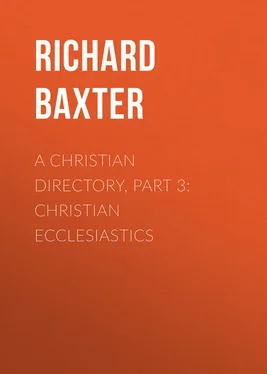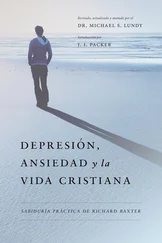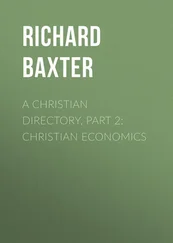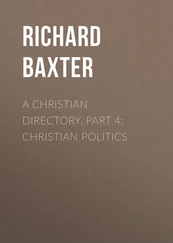Richard Baxter - A Christian Directory, Part 3 - Christian Ecclesiastics
Здесь есть возможность читать онлайн «Richard Baxter - A Christian Directory, Part 3 - Christian Ecclesiastics» — ознакомительный отрывок электронной книги совершенно бесплатно, а после прочтения отрывка купить полную версию. В некоторых случаях можно слушать аудио, скачать через торрент в формате fb2 и присутствует краткое содержание. Жанр: foreign_antique, foreign_prose, на английском языке. Описание произведения, (предисловие) а так же отзывы посетителей доступны на портале библиотеки ЛибКат.
- Название:A Christian Directory, Part 3: Christian Ecclesiastics
- Автор:
- Жанр:
- Год:неизвестен
- ISBN:нет данных
- Рейтинг книги:3 / 5. Голосов: 1
-
Избранное:Добавить в избранное
- Отзывы:
-
Ваша оценка:
- 60
- 1
- 2
- 3
- 4
- 5
A Christian Directory, Part 3: Christian Ecclesiastics: краткое содержание, описание и аннотация
Предлагаем к чтению аннотацию, описание, краткое содержание или предисловие (зависит от того, что написал сам автор книги «A Christian Directory, Part 3: Christian Ecclesiastics»). Если вы не нашли необходимую информацию о книге — напишите в комментариях, мы постараемся отыскать её.
A Christian Directory, Part 3: Christian Ecclesiastics — читать онлайн ознакомительный отрывок
Ниже представлен текст книги, разбитый по страницам. Система сохранения места последней прочитанной страницы, позволяет с удобством читать онлайн бесплатно книгу «A Christian Directory, Part 3: Christian Ecclesiastics», без необходимости каждый раз заново искать на чём Вы остановились. Поставьте закладку, и сможете в любой момент перейти на страницу, на которой закончили чтение.
Интервал:
Закладка:
To know yourself.
The doctrines which he is to teach you are these, and in this method to be taught. 1. He will teach you the natural knowledge of yourself; that being a man, you are a rational, free agent, made by another for his will and use, and by him to be ruled in order to your ultimate end, being wholly his, and at his disposal.
To know God and holiness.
2. He will next teach you that there is a God that made you, and what he is, and what relation he standeth in to you, and you to him, as your Creator, your Owner, your Ruler, and your Benefactor, and your End: and what duty you owe him in these relations, to submit to him, and resign yourselves to him as his own, to be obedient to all his laws, and to love him and delight in him; and this with all your heart, and soul, and might; even to serve him with all the powers of your soul and body, and with your estates and all his blessings.
To know the life to come.
3. He will next teach you that this God hath made your souls immortal, and that there is a life after this where everlasting happiness or misery will be your part, and where the great rewards and punishments are executed by the Judge of all the world as men have behaved themselves in this present life. That your end and happiness is not here, but in the life to come, and that this life is the way and time of preparation, in which everlasting happiness is won or lost.
Thus far he needeth no supernatural proof of what he saith; but can prove it all to you from the light of nature: and these things you are not primarily to receive of him as a testifier by mere believing him; but as a teacher, by learning of him the evidences by which you may by degrees come to know these things yourselves.
Yet it is supposed that all along you give him so much credit as the difference between his knowledge and yours doth require, so far as it appeareth to you; as you will hear a physician, a lawyer, a philosopher, or any man, with reverence, while he discourseth of the matters of his own profession; as confessing his judgment to be better than yours, and therefore more suspecting your own apprehensions than his. Not but that the truth may compel you to discern it, though you should come with no such reverence or respect to him; but then you cast yourself upon much disadvantage irrationally; and this human belief of him is but a medium to your learning, and so to the knowledge of the matter; so that you do not stop and rest in his authority or credibility, but only use it in order to your discovery of that evidence which you rest in, which as a teacher he acquaints you with.
These things being thus far revealed by natural light, are (usually) at first apprehended by natural reason, not so as presently to put or prove the soul in a state of saving grace; but so as to awaken it to make further inquiry; and so when the soul is come so far as to see the same truths by supernatural grace in the supernatural revelation of the holy Scriptures, then they become more effectual and saving, which before were known preparatorily; and so the same truths are then both the objects of knowledge and of faith.
To know that Christ, faith, repentance, and obedience, is the way to it.
4. Having acquainted you with man's ultimate end and happiness in the life to come, the next thing to be taught you by the ministers of Christ, is, that Christ as our Saviour, and faith, and repentance, and sincere obedience to be performed by us through his grace, is the way to heaven, or the means by which we must attain this end. Though the knowledge of the preacher's wisdom, piety, and credibility remove some impediments which would make the receiving of this the more difficult to you, yet you are not to take it barely on his word, as a point of human faith; but you are to call for his proof of it, that you may see better reasons than his affirmations for the entertainment of it.
To know that this is true because God hath revealed it; or it is his word.
5. The proof that he will give you is in these two propositions: 1. God's revelations are all true. 2. This is one of God's revelations: this is an argument, Whatsoever God saith is true: but this God saith, therefore this is true. The first proposition you are not to take upon the trust of his word, but to learn of him as a teacher to know it in its proper evidence; for it is the formal object of your faith: the veracity of God is first known to you, by the same evidence and means as you know that there is a God; and then it is by the force of this that you believe the particular truths which are the material object of faith. And the second proposition, that God hath revealed this, is orderly to be first proved, and so received upon its proper evidence; and not taken merely upon your teacher's word: yet if you do believe him by a human faith as a man that is likely to know what he saith, and this in order to a divine faith, it will not hinder, but help your divine faith and salvation; and is indeed no more than is your duty.
Here note, 1. That primarily these two great principles of faith, God is true, and this is God's revelation, are not themselves credenda , the material objects of divine faith, but of knowledge. 2. That yet the result of both is de fide , matter of faith. 3. And the same principles are secondarily de fide , as it is that there is a God. For though they are first to be known by natural evidence, yet when the Scripture is opened to us, we shall find them there revealed; and so the same thing may be the object both of knowledge and of faith. 4. And faith itself is a sort of knowledge; for though human faith have that uncertainty in its premises, (for the most part,) as forbiddeth us to say, (properly,) I know this to be true, because such a man said it; yet divine faith hath that certainty which may make it an excellent sort of knowledge; as I have proved copiously elsewhere. In believing man we argue thus, Whatsoever so wise and honest a man saith, is credible, that is, most likely to be true: but this he saith; therefore, &c. But in believing God we argue thus, Whatever God saith is credible, that is, as infallible truth: but this God saith; therefore, &c. So that the word credible, signifieth not the same thing in the two arguments; nor are divine faith and human faith the same.
To know that the gospel is his word.
6. The next thing that the preacher hath to teach you, is the proof of the aforesaid minor proposition (for the major was proved in the proof of a Deity); and that is thus: The gospel which Christ and his apostles first preached, and is now delivered in the sacred Scriptures, is the word, or infallible revelation, of God: but this doctrine, that Christ, with faith, and repentance, and obedience on our parts, are the way to life eternal, is the gospel which Christ and his apostles first preached, &c.; therefore it is the word of God. For the minor you need not take your teacher's word, if you can read; for you may see it in the Bible (of which more anon): but the major is that which all men desire to be assured of, That the gospel is God's word. And for that, though a belief of your teacher is a help and good preparatory, yet you are not there to stop, but to use him as a teacher to show you the truth of it in the proofs: or else you must take any thing for God's word, which your teacher affirmeth to be such. And the proof which he will give you, must be some divine attestation which may be showed to those whom we would convince.
The Divine attestation of the gospel.
7. The divine attestation, which he is next to show you, hath many parts, that it may be complete and satisfactory. 1. God's antecedent testimony. 2. His inherent or impressed testimony. 3. His adherent, concomitant testimony. 4. His subsequent testimony. 1. God's antecedent testimony by which he attested the gospel, is the train of promises, prophecies, types, and the preparing ministry of John, which all foretold Christ, and were fulfilled in him. 2. God's impressed testimony is that image and superscription of God, (in his governing wisdom, holiness, and love,) which is inimitably engraven on the gospel; as an image upon a seal, which is thereby made the instrument to imprint the same on other things. Thus as the sun, the gospel shineth, and proveth itself by its proper light. 3. The concomitant attestation of God, is that of multitudes of certain, uncontrolled miracles, done by Christ and his apostles, which proved the approving hand of God, and oblige all rational creatures to believe a testimony so confirmed to them. Among these, Christ's own resurrection and ascension, and the gifts of his apostles, are the chief. 4. The subsequent attestation of God is, the power and efficacy of the gospel, in calling and sanctifying unto Christ a peculiar people, zealous of good works, and directing and confirming them against all temptations and torments to the end; producing that same image of God on the souls of his elect, which is (more perfectly) engraven on the world itself; making such changes, and gathering such a people unto God, as no other doctrine ever did. And all these four attestations are but one, even the Holy Spirit, who is become the great witness of Christ and his gospel in the world: viz. 1. The Spirit of prophecy is the antecedent attestation. 2. The holy image which the Spirit hath printed on the gospel itself, is the inherent evidence. 3. The miracles of the Spirit, is the concomitant attestation or evidence. 4. And the sanctifying work of the Spirit is the subsequent attestation, renewed and accompanying it to the end of the world. So that the argument runs thus, That doctrine which hath this witness of the Holy Ghost, antecedently in such prophecies, inherently bearing his image so inimitably, accompanied by so many certain, uncontrolled miracles, and followed and attended with such matchless success in the sanctification of the body of Christ, is fully attested by God to be his own: but such is the doctrine of the gospel; therefore, &c. The major you are not to take upon trust from your teachers, though your esteem of their judgment may the better dispose you to learn; but you are to discern the evidences of truth which is apparent in it. For he that denieth this, must by force of argument be driven to deny, 1. Either that God is the Governor of the world; or that he is the supreme, but say he is controlled by another. 2. Or that he is good and true; and must affirm that he either governeth the world by mere deceits, and undiscernible lies, or that he hath given up the power to some one that so governeth it: all which is but to affirm that there is no God (which is supposed to be proved before).
Читать дальшеИнтервал:
Закладка:
Похожие книги на «A Christian Directory, Part 3: Christian Ecclesiastics»
Представляем Вашему вниманию похожие книги на «A Christian Directory, Part 3: Christian Ecclesiastics» списком для выбора. Мы отобрали схожую по названию и смыслу литературу в надежде предоставить читателям больше вариантов отыскать новые, интересные, ещё непрочитанные произведения.
Обсуждение, отзывы о книге «A Christian Directory, Part 3: Christian Ecclesiastics» и просто собственные мнения читателей. Оставьте ваши комментарии, напишите, что Вы думаете о произведении, его смысле или главных героях. Укажите что конкретно понравилось, а что нет, и почему Вы так считаете.












